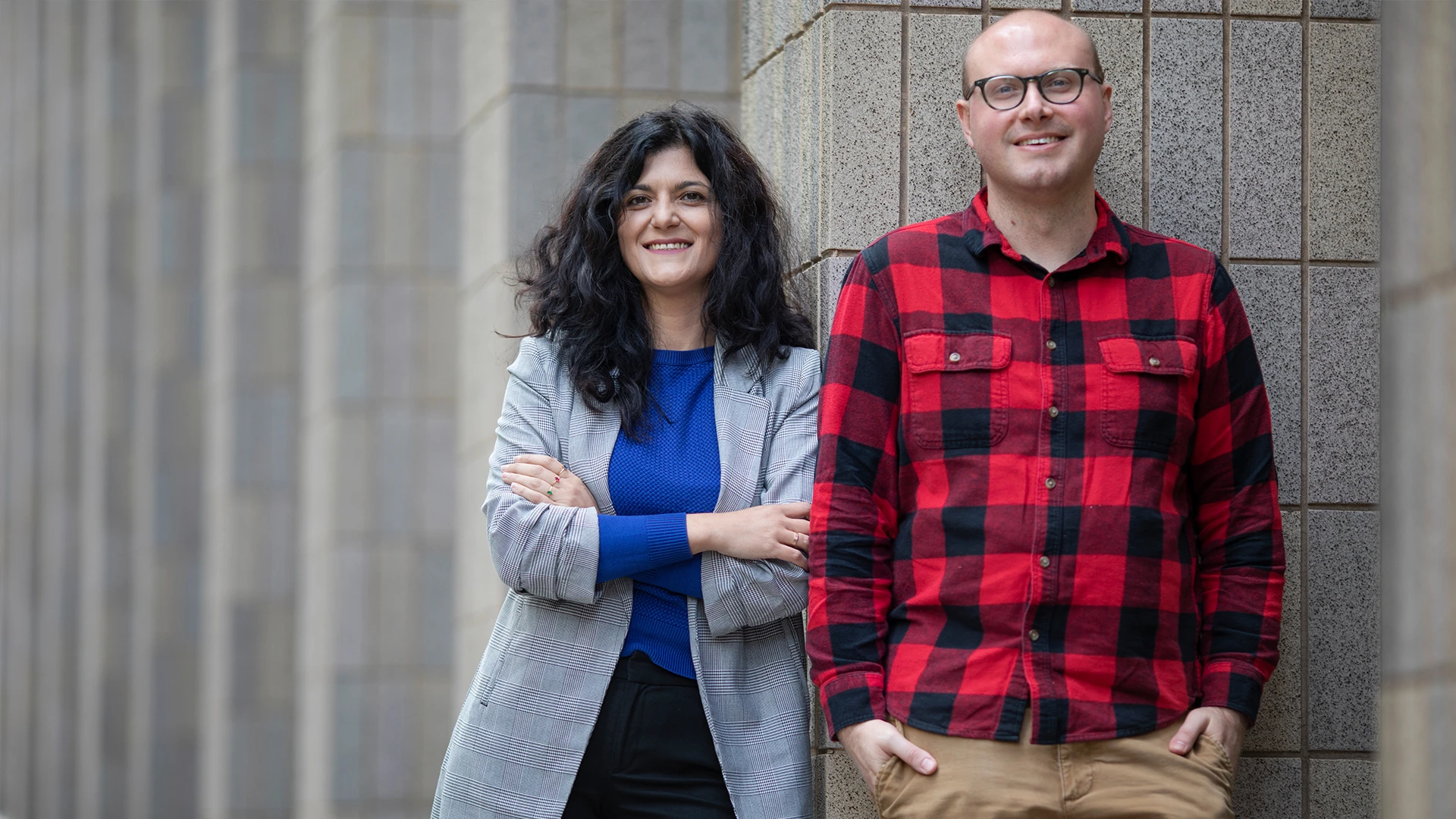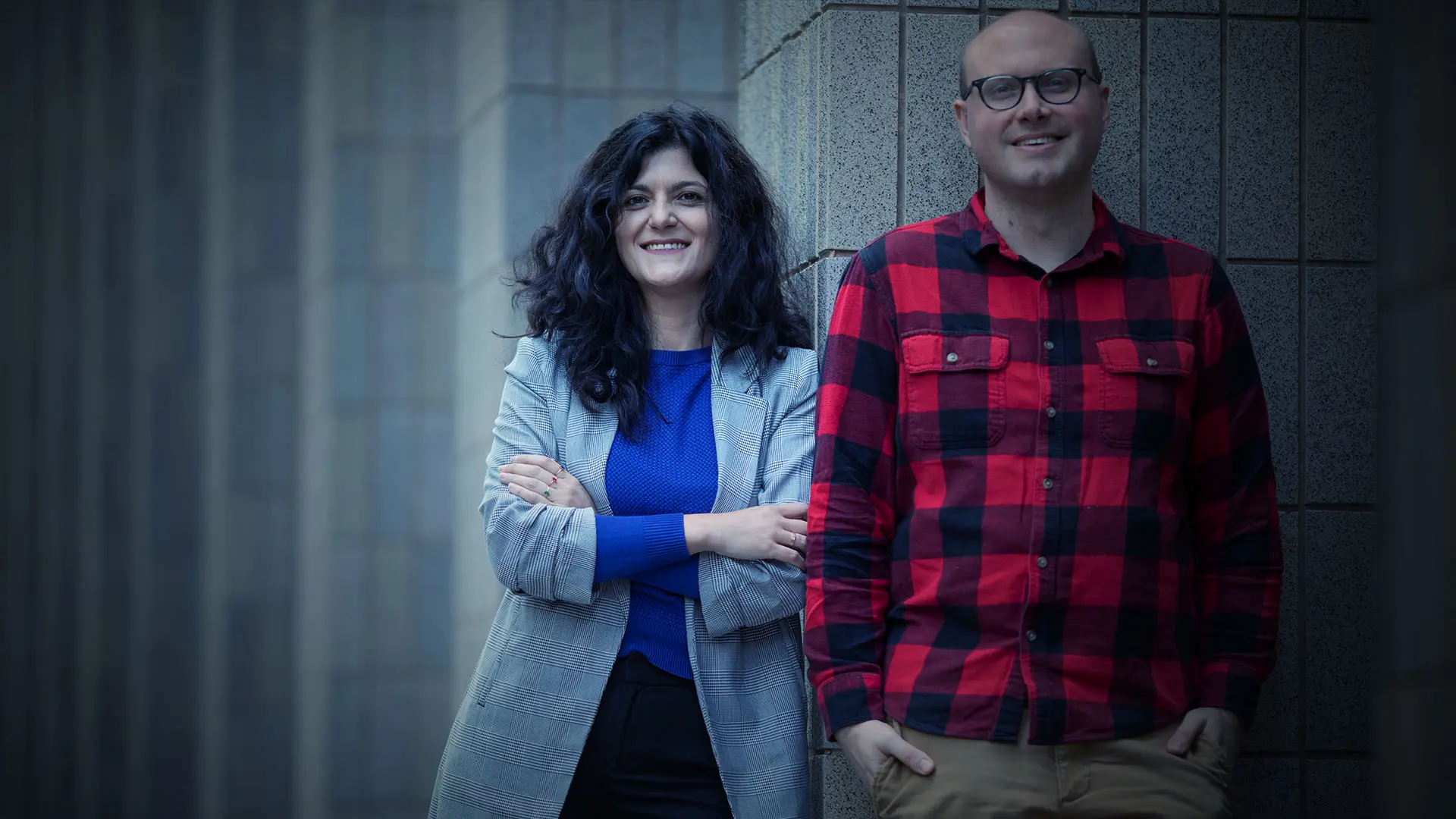He soon would be the lead author of a major study investigating the impact of ubiquitous chemicals known as perfluoroalkyl substances (PFAS), or “forever chemicals,” on women’s fertility. By the time the study was published in March 2023 in Science of The Total Environment, Dr. Cohen had become an expert in the field, lending his voice to a seasoned team of Mount Sinai researchers warning women everywhere who are planning to conceive of the harmful effects of environmental chemical exposures.
What changed the equation for Dr. Cohen was joining the lab of Damaskini (Dania) Valvi, MD, PhD, MPH, Associate Professor of Environmental Medicine and Public Health at the Icahn School of Medicine at Mount Sinai (Icahn Mount Sinai), who is an internationally renowned expert on the dangers of PFAS, which are water- and grease-resistant chemicals found in drinking water and a wide range of consumer products.

From left: Damaskini (Dania) Valvi, MD, PhD, MPH, and Nathan Cohen, PhD
Dr. Valvi is an environmental epidemiologist who trained at the Harvard T.H. Chan School of Public Health, where she also worked as a research scientist before joining Icahn Mount Sinai as a faculty member in 2019. Her research is focused on understanding the impacts of the exposome—the totality of environmental exposures individuals experience over their lifespan—on metabolic and hormone diseases, and translating this knowledge into precision medicine approaches that improve the prevention, early detection, and treatment of chronic diseases in the population.
She is the principal or co-principal investigator on multiple National Institute of Environmental Health Sciences-supported projects that examine the potential effects of environmental chemical mixtures and gene-environment interactions in the risks for diabetes and liver disease in large multi-ethnic populations, such as those represented in Mount Sinai’s BioMe® biobank that has enrolled more than 70,000 participants to date.
“Because Dr. Valvi is such a highly regarded researcher, I learned a lot from her about the hormone-disrupting properties of PFAS and how they can affect fertility,” says Dr. Cohen. “Her knowledge has helped me formulate new research ideas and hypotheses, and the fact she has so many projects going on with so many people has allowed me to expand my network.”
The PFAS-fertility study drives the point home. Among Dr. Cohen’s collaborators were renowned investigators from the Singapore Institute of Clinical Sciences, who enrolled the population-based S-PRESTO cohort of more than 1,000 women of childbearing age in Singapore who were trying to conceive. Tracking these women for at least a year, researchers learned that higher blood concentrations of PFAS were associated with as much as a 40 percent reduction in the likelihood of pregnancy and live birth.
“Our study was among the first to measure PFAS at preconception and demonstrate the association of these forever chemicals with infertility in women who were generally healthy and trying to conceive naturally.”
— Dania Valvi, MD, PhD, MPH
“Previous studies in animals have shown that these forever chemicals can affect reproductive hormone levels, but data in women are very limited,” says Dr. Valvi. “Our study was among the first to measure PFAS at preconception and demonstrate the association of these forever chemicals with infertility in women who were generally healthy and trying to conceive naturally.”
In addition to working closely with scientists in Singapore, Dr. Cohen benefitted from the knowledge and unique resources of the Institute for Climate Change, Environmental Health, and Exposomics in the Department of Environmental Medicine and Public Health at Mount Sinai, which is committed to advancing innovative research and growing the public’s understanding of how environmental exposures affect health and disease. This Institute’s work has led to significant breakthroughs in the role of environment in autism, asthma, obesity, and neurological conditions, such as Alzheimer’s disease, and cancers.
Dr. Valvi says the Department of Environmental Medicine and Public Health attracts exceptionally talented and committed graduate students and postdoctoral fellows. “They join Mount Sinai,” she says, “not just to learn, but because they care, they want to do something good and they have a strong commitment to improving public health.”
She cites Dr. Cohen as a prime example of that ethos. “Even though Nate had no experience in investigating chemical exposures, he had a strong curiosity and desire to learn about environmental epidemiology methods and new analytical approaches that allow us to study the effects of chemical mixtures on human health,” she says. The PFAS-fertility study, she adds, was “a great opportunity for him to dive into this new research topic,” while providing a platform to advocate for women’s health.
For his next step on the career trail, Dr. Cohen is aiming for a position that involves equal parts research and teaching. Here again, his relationship with Dr. Valvi has proven pivotal.
Aware of his fondness for teaching, she invited him to join as a lab instructor for the Research Seminar in Epidemiology course within the Master of Science in Epidemiology program at Mount Sinai’s Graduate School of Biomedical Sciences, a program she established as co-director in 2020 after she joined Mount Sinai.
Our Master of Science in Epidemiology program—outstanding research opportunities for students at the largest health care system in New York City
Through a rigorous 12-month curriculum that places heavy emphasis on research methods, students learn how to conduct an epidemiology study, collect, analyze, and interpret data from population studies, and communicate their findings in effective ways to promote public health. Dr. Valvi, who teaches the Research Seminar in Epidemiology course, says that Dr. Cohen was instrumental in assisting the students with their research projects throughout the course. She is also the co-director of the Big Data Epidemiology: Introduction to OMICS Research course within the Master of Science in Epidemiology program.
“What differentiates our program from others is the outstanding research opportunities for our students at the largest health care system in New York City, where epidemiology and public health research led by our faculty flourishes,” says Dr. Valvi. “Mount Sinai offers great opportunities for students to work with real-world data and gain practical experience in applying innovative research methods, such as exposomics and other omics tools, into their studies aimed at accelerating our understanding of disease caused by environmental exposures we experience in our daily lives.”
